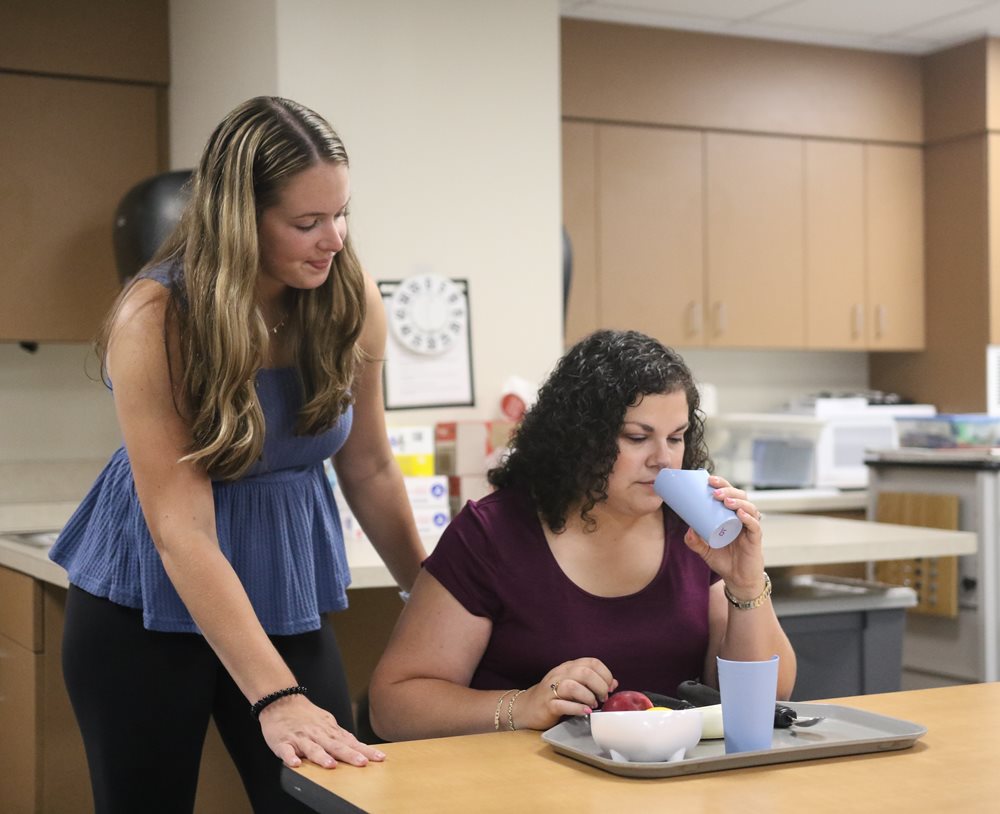Speech & Swallowing Problems with Multiple Sclerosis
 Many people know multiple sclerosis can result in weakness that affects the ability to walk. But multiple sclerosis can also result in weakness of the muscles that controls speech and swallowing.
Many people know multiple sclerosis can result in weakness that affects the ability to walk. But multiple sclerosis can also result in weakness of the muscles that controls speech and swallowing.
The National Multiple Sclerosis Society estimates 25 to 40 percent of people with multiple sclerosis have difficulty with speech, voice and swallowing. Specialists believe they are caused by MS lesions (damaged areas) in the part of the brain responsible for muscle control of the lips, tongue, soft palate, vocal cords, or diaphragm.
Speech problems include dysarthria, a speech disorder which typically results in slurred or poorly articulated speech. There may also be reduced loudness, unnatural emphasis, and a lower rate of speech. Dysphonia is a voice disorder which involves changes in vocal quality, such as harshness, hoarseness, breathiness, or a hypernasal sound.
Tips to Improve Speech
Speak Slowly
It’s OK to take your time. Rely on others to be patient, so you can speak as slowly as you need.

Take it easy when you’re tired
Fatigue makes speech more difficult. If you’re feeling tired, it’s OK to choose to speak less.
Talk with your body
People don’t just communicate through speech. You can use gestures, eye contact, and facial expressions, or refer to objects. These options reduce the stress of having to talk if you aren’t feeling up to it.
Type it out
Smartphones and other devices can be useful. You can text, email, or write out phrases. This can help you have longer conversations.
Work with a therapist
Speech therapy for multiple sclerosis focuses on improving the strength, endurance and coordination of the mouth and throat muscles. Speech therapy may be helpful if weak facial muscles or lesions have affected your ability to talk or swallow.
A speech-language pathologist (SLP) is specifically trained to help people with speech challenges. The Speech-Language Institute of Salus University (SLI) has a team of professional speech-language pathologists. They can assist those with dysarthria by evaluating the nature and severity of the condition and creating a customized evaluation and treatment plan.
Swallowing problems (dysphagia) include coughing or choking when eating and feeling like food is lodged in the throat. Multiple sclerosis can damage the nerves in areas that control these functions. If problems with swallowing are not corrected, malnutrition or dehydration can result. Lung infections or aspiration pneumonia are other possible consequences of swallowing dysfunction.
 If you have symptoms of dysphagia or aspiration, you need to be checked. A speech-language pathologist may start by asking you about your health, past illnesses, surgeries, and your swallowing problems. The SLP will also look at your teeth, lips, jaws, tongue, and cheeks. They may also check how you swallow different consistencies of liquids and foods. They can do special tests, if needed.
If you have symptoms of dysphagia or aspiration, you need to be checked. A speech-language pathologist may start by asking you about your health, past illnesses, surgeries, and your swallowing problems. The SLP will also look at your teeth, lips, jaws, tongue, and cheeks. They may also check how you swallow different consistencies of liquids and foods. They can do special tests, if needed.
Treatment plans vary depending upon the type and cause of swallowing disorder. Some techniques SLPs use are: specific swallowing exercises, positions or strategies to help someone swallow better – such as using thickening liquids to make things easier to swallow – or recommending certain foods/liquids.
If you or a loved one has difficulty swallowing or are in need of speech language therapy, contact the Speech-Language Institute today at 215.780.3150.